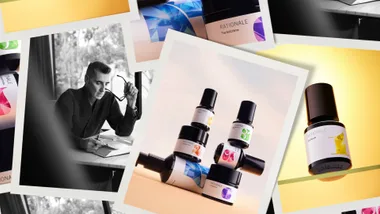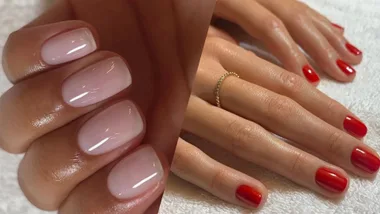We’re just going to say it: the world of skincare can be overwhelming — particularly when it comes to day vs. night beauty routines.
Between shelfie-worthy packaging, beckoning sites brimming with the latest product launches, rules and myths being circulated in Facebook groups and new ‘It’-ingredients waltzing into town every second day, picking your skincare for smooth skin and healthy skin is a task in and of itself — never mind which ones deserve starring roles in your daytime routine, and which at night.
That said, help is at hand. To break down which beauty products prefer to salute the sun and which ones like to play night owl, we consulted Dr. Michele Squire, a PhD-qualified skincare scientist and founder of personalised skincare consultancy QR8, for everything there is to know.
Consider this your guide to the best antioxidants (think vitamin C, vitamin E and vitamin B3), ingredients and products to give you a stronger skin barrier, and smooth skin, day or night.
Which Skincare Products Do You Use In The Day Vs. Night?
When it comes to your core skincare lineup there are only two hard and fast rules, according to Dr. Squire.
“SPF is for daytime (obvi!) and over the counter retinols and prescription tretinoin is for night-time, because it degrades in UV light,” she said.
“Other than that, it’s all down to your individual preferences for texture and choosing layers that play nicely with makeup and sunscreen.”

Which Active Ingredients Should You Use In The Day And Which At Night?
Here’s where it gets a little more complicated. When it comes to your concentrated vitamin serums and exfoliating actives, some of them are best relegated to nocturnal status, while others belong in the early bird camp.
So, to simplify things, check out Dr. Squire’s guide to deciphering which active skincare ingredients to use in the morning, and which to leave for nighttime:
Sunscreen
Day
Yes, we know it’s a no-brainer, but it’s arguably the most important product in your skincare routine, it’s coming in right at the top. That said, it’s worth noting there’s no issue with using an SPF moisturiser at night now and then, in case your go-to cream runs out.
“It isn’t harmful to use your SPF moisturiser at night every now and then, but also not necessary,” Dr. Squire says.
Vitamin C
Day (With One Exception)
One of the best antioxidants, vitamin C helps to strength the skin’s barrier, and reduce the oxidative damage caused by external stressors (that means you can say goodbye to pigmentation and rough skin texture, and hello to smooth skin that also has that signature vitamin C glow).
“Vitamin C is a topical antioxidant that can boost your protection against UV damage so it makes sense to wear it during the day,” Dr. Squire tells marie claire Australia.
“There have been several studies showing that UV exposure during the day can cause continued DNA damage at night, but it is via a different biochemical pathway to the oxidative damage that is quenched by antioxidants like topical vitamin C. So, I would stick to vitamin C in the daytime for now.”
One exception?
“Some anhydrous vitamin C formulations (non water-based solutions) use silicones, which make those serums cosmetically unappealing and not ideal for use during the day with makeup/sunscreen,” Dr. Squire adds.
Vitamin B (Niacinamide)
Day or Night
We always knew we liked vitamin B3 for a reason (you know, besides its pigmentation fighting prowess and ability to strengthen our skin barriers to maintain moisture)! Turns out, vitamin B3 is quite happy to make friends with both your day and night skincare routines.
“No rules about this. Topical B3 has been tested as safe and nonirritating up to 20% concentration in human skin, although it’s effective range is 2-5%,” Dr. Squire explains.
“This is a good thing because you can find it in lots of different products!”
Vitamin E
Day or Night
Vitamin E is a shortcut to smoother, healthier skin, as the antioxidant guards the skin’s barrier and improves hydration. It also protects from free radicals in the environment, with moisturising benefits that help reduce rough skin texture for softer, smoother skin.
“This is often combined with vitamin C, and is present in small amounts as a formulation antioxidant in many products. So day or night use is fine,” Dr. Squire says.
A powerful trio of the best antioxidants
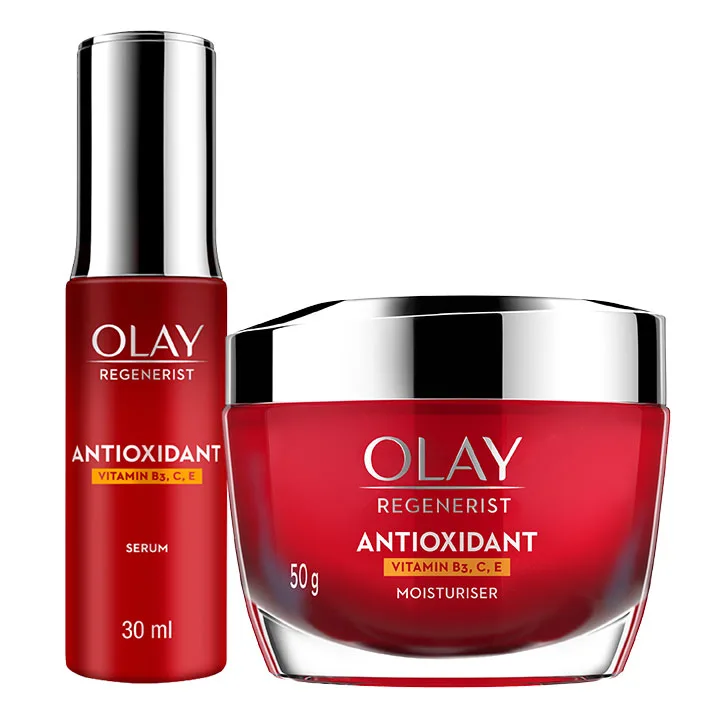
For a powerful boost of antioxidants, use products that contain all three of these skincare superhero vitamins. Olay’s Regenerist Antioxidant (Vitamin B3, C & E) Serum is made with Olay’s most active and scientifically advanced formula, combining vitamin B3, vitamin C and vitamin E to strengthen the skin barrier for smoother skin.
In fact, after just two weeks of use, 89 per cent of users had smoother skin* and up to 40 per cent stronger skin barrier against external environmental stressors**.
The best part? It comes in a moisturiser and serum form, so you can slot the antioxidant-rich range into any part of your skincare routine, day or night.
Hyaluronic Acid
Day or Night
Another one that’s happy to tag along with both the morning and night crews, hyaluronic acid is perfectly poised to lend its moisture-boosting properties on both occasions—all while giving us a stronger skin barrier.
“No rules about this. Hyaluronic acid mostly sits on top of skin where it forms a protective layer of hydration, so it is removed when you cleanse. [It] can be applied whenever you like, although some are stickier than others, so it will depend on how it plays with makeup etc.,” Dr. Squire explains.
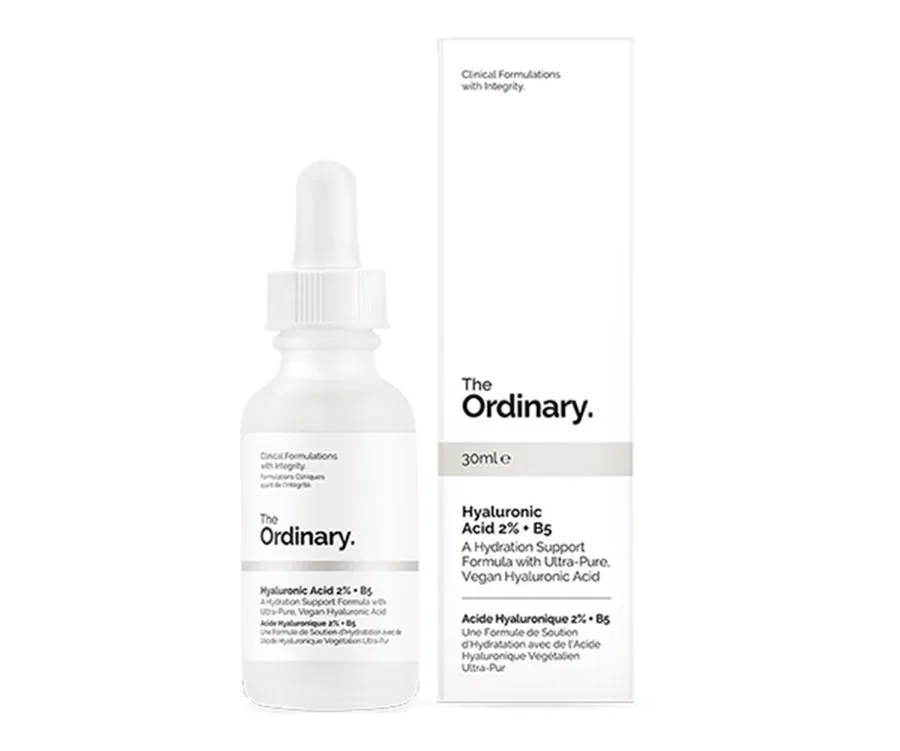
The Ordinary Hyaluronic Acid 2% + B5 30ml, $12.90 at Adore Beauty
Retinoids/Vitamin A
Night (With a Few Exceptions)
When it comes to vitamin A-based products, that fight rough skin texture for smooth skin by promoting skin renewal and enhancing collagen production, it gets a little trickier. The general ‘rule’ is to avoid wearing vitamin A during the day because it compromises the efficacy of the product.
“Over the counter vitamin A products (retinol, retinal, retinyl palmitate/acetate) and some retinoids (like tretinoin, available on prescription) break down in UV light,” Dr. Squire tells marie claire.
As far as your acne-specific, prescription retinoids go, it’s actually perfectly fine use them during the day.
“Retinoids specific for acne (tazarotene, adapalene) are photostable though, so they can be used in the day as well as night. There is also a stabilised form of tretinoin (using microspheres) that is UV photostable, but not yet available in Australia,” she adds.
Glycolic Acid
Night (or Day With Strong SPF)
One of the commonly used alpha hydroxy acids (AHAs), glycolic acid’s exfoliating excellence (think: no more rough skin texture) is generally employed at nighttime.
“Glycolic acid can increase your chances of getting a sunburn after a shorter time in the sun, whilst you are using it in your routine (not whilst it is actually on your skin!). This effect ceases around one week after you stop using it,” Dr Squire notes.
That said, it can be used during the day, especially as it’s often incorporated into products like toners, but must be followed up by a high SPF sunscreen.
Lactic Acid
Night (or Day With Strong SPF)
Also a popular AHA for smooth and healthy skin, particularly for sensitive skin, lactic acid can also be used day or night, but arguably best relegated to nighttime.
“The same studies haven’t been performed with lactic acid [as glycolic acid] but using glycolic acid as the reference molecule, we assume the same is true for lactic acid. So you can use AHAs day or night, but take extra care with sun protection,” Dr. Squire advises.
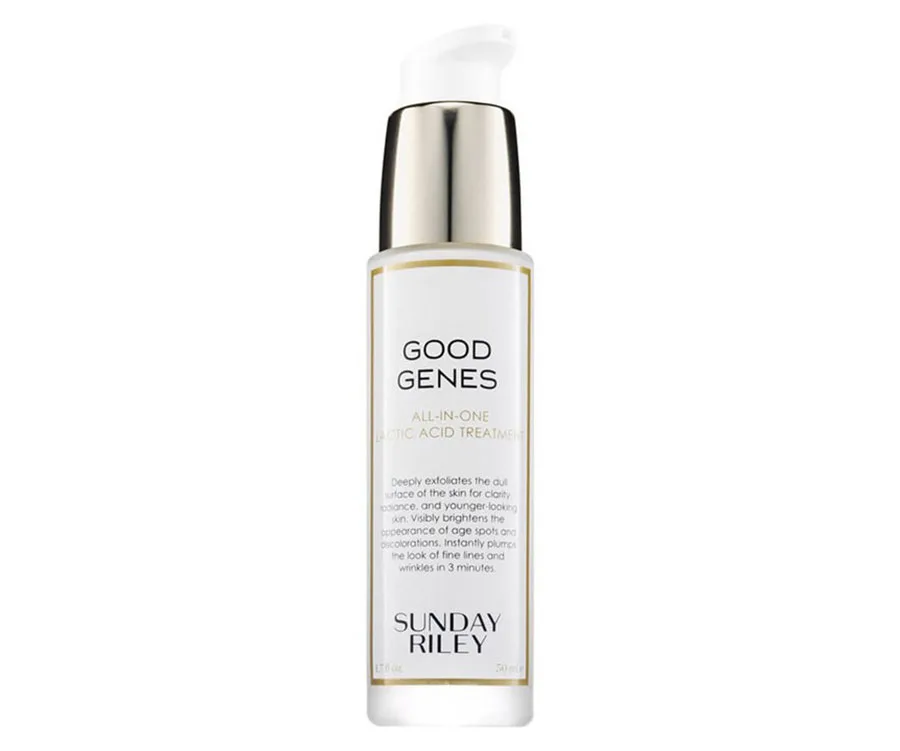
Sunday Riley Good Genes Lactic Acid Treatment, $184 at MECCA
Salicylic Acid
Day or Night
One of the most popular Beta Hydroxy Acids (BHAs), salicylic acid is an ultra-common ingredient in many acne fighting products, and is well-suited for both day and night.
“BHA, along with the newer polyhydroxyacids (e.g. gluconolactone), do not result in increased photosensitivity, so day or night use is fine but don’t stop using your sunscreen!” says Dr. Squire.
Benzoyl Peroxide
Day or Night (With One Exception)
Often found spot treatments and acne-focused skincare products that give us smooth skin that is also healthy skin, benzoyl peroxide is generally okay to use either in the morning or night, with one exception.
“Benzoyl peroxide can be used during the daytime, but is often combined into formulations with other acne-fighting retinoids. So, if it is combined with tretinoin, then it’s nighttime use only,” Dr. Squire says.
Hydroquinone
Day or Night (With One Exception)
Considered one of the best ingredients for pigmentation on the market, hydroquinone can be used both day and night, with one caveat.
“When used on its own, hydroquinone is safe to use during the daytime, and is often prescribed for twice daily use,” Dr. Squire explains.
“When used as part of the ‘triple therapy’ combination of tretinoin, hydroquinone, steroid, it can only be used at night.”
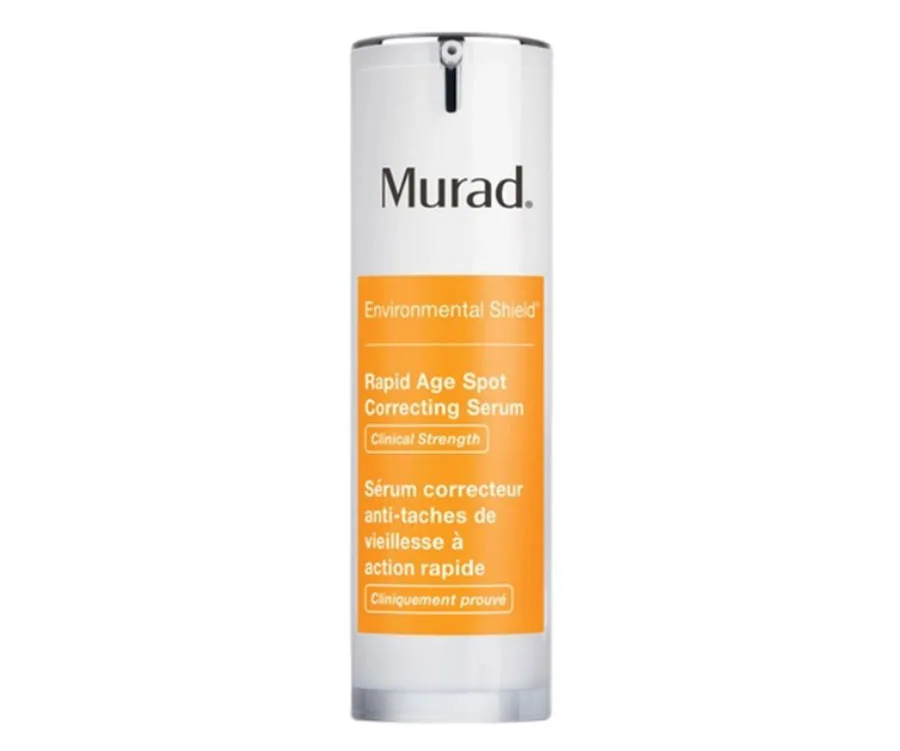
Murad Rapid Age Spot Correcting Serum, $115 at Sephora
Peptides
Day or Night
There are no rules when it comes to this anti-ageing wonders! Peptides, which a short-chain amino acids that help boost proteins like collagen, elastin and keratin for smooth skin, are free to perform their anti-ageing missions at any time of the day.
Overwhelmed By Day Vs. Night Skincare? Just Remember…
“There aren’t too many hard and fast rules, and if you’re already practising sun safety then photosensitivity isn’t a big deal. Many of my clients use exactly the same routine morning and night, just adding in sunscreen during the day and a prescription retinoid at night,” Dr Squire says.
Brought to you by Olay.
* Consumer agreement study, 98 subjects, UK 2021
** vs. no treatment. Consumer study, Singapore 2021.






